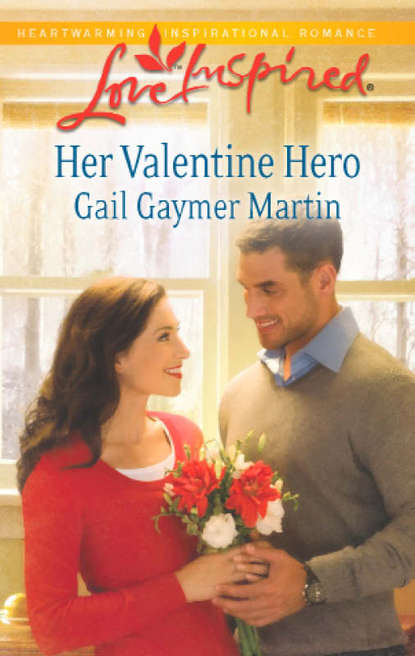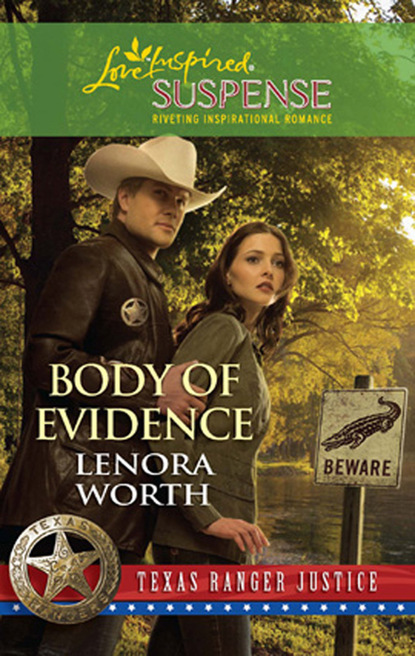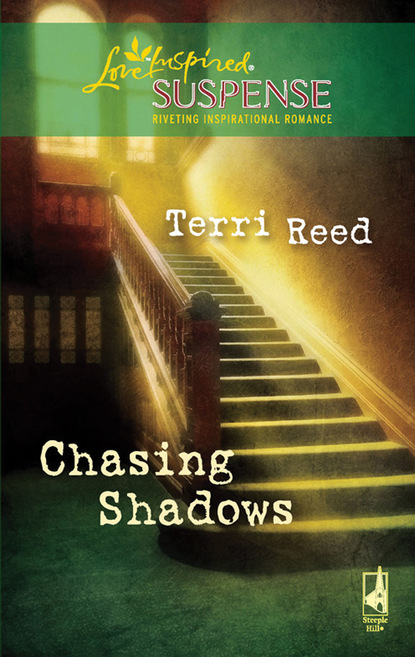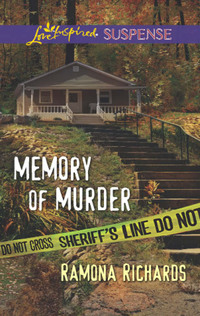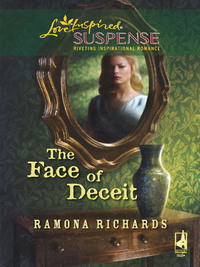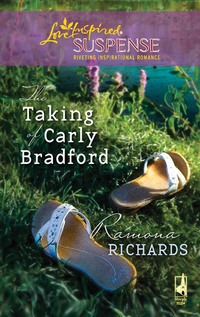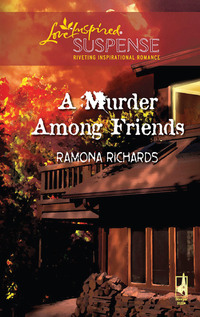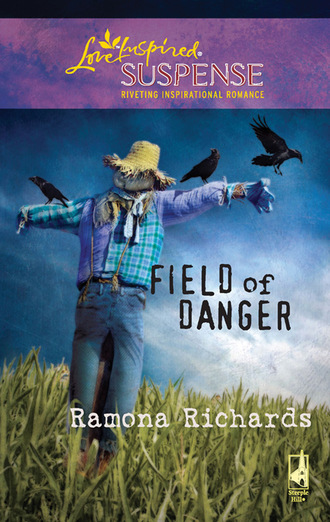
Полная версия
Field of Danger

Her house had been destroyed!
Her mind clicked like a telegraph through what would have to be replaced. The television, the carpet, the curtains that hung half off their rods…
The curtains.
April froze, her eyes narrowing. She looked at the police officer next to her. “Did you close the drapes?”
He shook his head, and Daniel gestured toward the window. “Open them.”
Picking his way through the shards of April’s life, the man fumbled through the ripped cloth for the cord, then slowly drew back the drapes.
At the sight of the windows, Daniel gasped out a low, choked prayer. “Dear God, save us.”
April’s eyes widened as her breath left her. She stumbled back against Daniel, who braced her, his hands closing on her shoulders.
The block letters trailed across the glass in smeared reddish-bronze lipstick, and the splintered tubes clustered beneath the window, crushed into the carpet.
The message was simple.
YOU TALK
YOU DIE
MILLS & BOON
Before you start reading, why not sign up?
Thank you for downloading this Mills & Boon book. If you want to hear about exclusive discounts, special offers and competitions, sign up to our email newsletter today!
SIGN ME UP!
Or simply visit
signup.millsandboon.co.uk
Mills & Boon emails are completely free to receive and you can unsubscribe at any time via the link in any email we send you.
RAMONA RICHARDS
A writer and editor since 1975, Ramona Richards has worked on staff with a number of publishers. Ramona has also freelanced with more than twenty magazine and book publishers and has won awards for both her fiction and nonfiction. She’s written everything from sales-training video scripts to book reviews, and her latest articles have appeared in Today’s Christian Woman, College Bound and Special Ed Today. She sold a story about her daughter to Chicken Soup for the Caregiver’s Soul, and Secrets of Confidence, a book of devotionals, is available from Barbour Publishing.
In 2004, the God Allows U-Turns Foundation, in conjunction with the Advanced Writers and Speakers Association (AWSA), chose Ramona for their “Strength of Choice” award, and in 2003, AWSA nominated Ramona for Best Fiction Editor of the Year. The Evangelical Press Association presented her with an award for reporting in 2003, and in 1989 she won the Bronze Award for Best Original Dramatic Screenplay at the Houston International Film Festival. A member of the American Christian Fiction Writers and the Romance Writers of America, she has five other novels complete or in development.
Field of Danger
Ramona Richards

For God hath not given us the spirit of fear;
but of power, and of love, and of a sound mind.
—2 Timothy 1:7
To Phyllis, for all your advice and love.
I didn’t choose you as Rachel’s co-conservator;
God did. I’m just the grateful one.
CONTENTS
CHAPTER ONE
CHAPTER TWO
CHAPTER THREE
CHAPTER FOUR
CHAPTER FIVE
CHAPTER SIX
CHAPTER SEVEN
CHAPTER EIGHT
CHAPTER NINE
CHAPTER TEN
CHAPTER ELEVEN
CHAPTER TWELVE
CHAPTER THIRTEEN
CHAPTER FOURTEEN
CHAPTER FIFTEEN
CHAPTER SIXTEEN
CHAPTER SEVENTEEN
CHAPTER EIGHTEEN
CHAPTER NINETEEN
CHAPTER TWENTY
QUESTIONS FOR DISCUSSION
ONE
When the shotgun went off, April Presley dropped her thermos and screamed.
Hearing her own scream scared her almost as much as the man with the gun did, and April clamped both hands over her mouth as she watched her next-door neighbor, Levon Rivers, crumple in the middle of the newly plowed section of his field. Levon and his killer were almost fifty yards away, but even at that distance, April could see the blossom of red on Levon’s chest and a cold brace of fear flooded through her.
Then another screech burst through her tightly clamped hands as the killer swung around toward her, his face a blurry mask to her dazed, bewildered eyes. Without hesitation, he lifted the gun and fired again.
April ran.
The morning had started out so peacefully.
As usual, April had spent her morning half on business and half on enjoying the luscious garden of flowers, herbs and vegetables behind her cottage. Since moving to the tiny town of Caralinda, Tennessee, April had found solace and a kind of spiritual comfort in her gardening. Levon, whose cornfield ran right up to the edge of April’s yard, had given her tips that had turned the wimpy cluster of plants into a thriving garden that filled the morning air with the scent of roses, lavender, sage, fuchsia, rosemary and a whole forest of day lilies.
In turn, April brought Levon a thermos of cold lemonade every day that he worked in the field. The sound of his tractor or truck thumping down the field road that ran alongside her house was her cue. Around ten in the morning, she’d wend her way through his cornfield to wherever he worked. Lemonade in the mornings was her token of thanks, and delivering it was usually much more of a joy than a chore.
Yet today, she had barely stepped from between the dense rows of stalks when the shot rang out, her gesture of friendship suddenly putting her in the line of fire. April fled, grateful for high summer and a corn patch thick enough to hide her, grateful that she had walked this field enough with Levon to keep her footing among the dry ruts and clumps of earth. She knew how to keep her head low and her arms out to push away the sharp green blades that slapped around her as she ran.
She was especially grateful that a shotgun had a limited range.
All these things helped her evade the killer, and April could hear his grunts of frustration as he tried to catch her through the corn, then heard the blast that did little but rain shotgun pellets harmlessly over the field. Finally April stopped, holding her sides and trying to catch her breath. She couldn’t run any farther. She’d have to take her chances with staying hidden. She could still hear him stomping about, raging through the corn, the noise growing closer, then moving away, constantly demanding that she show herself. She could stay hidden a long time in Levon’s expansive field, especially if the killer kept making a racket covering the sounds of her own movements as she slipped out of his path. But April knew if someone didn’t come, he’d continue to search. And eventually find her.
April’s knees buckled, and she dropped to the ground. Adrenaline and fear fogged her mind and made her arms and legs tremble uncontrollably. She needed to rest, make a plan. Calm down, girl. Lord, I need Your help. Guide me out of this. Show me what I need to do. She drew her knees to her chest and hugged them to her, trying to still her quivering limbs. If she could only get home, call for help. But she’d gotten so turned around she knew she wouldn’t be able to find the path without standing up fully to get her bearings…and putting herself back in the killer’s sight. How would she get out of the field without the killer seeing her? And had he seen her well enough to know who she was?
These questions echoed in her mind. Her muscle tremors quieted, but her thoughts still swirled out of control, pushing her close to panic. She fought to sit still, to focus.
Normally the smell of the ripening corn and tangy scent of the leaves refreshed her. Today, they were oppressive. The hard-packed earth absorbed the sun while the dense rows of corn blocked most of the wind. April felt as if she were sitting in an oven. Her stomach growled, and she held her breath, waiting to see if the killer had heard it. What do I do now?
He hadn’t. The killer’s calls actually lessened as he moved farther away. But she could still hear him, his actions muffled by the plants and the stifling air of midday. April dared to stand up just enough to get her position, then ducked back down and closed her eyes, trying to plan. Her home and Levon’s bordered a field road south of these acres of corn, but the shooter still prowled between her and those points of safety. To the east lay the open field where the shooting had occurred and west of her, a narrow country road wandered through the landscape. The open land in both of those directions could easily put her into direct contact or line of sight with the killer, with no place to hide. Not a good idea.
North? April opened her eyes. Now that direction held a glimmer of hope. Just beyond the cornfield…
Soft footsteps padded in the dirt behind her, and April spun around, her heart almost stopping with fear. An old woman stood there, her long white hair held down by a wide-brimmed straw hat and her finger pressed to her lips, indicating that April should remain silent. Beside her, a white German shepherd stood, head held low and pressed against the woman’s hip.
Gulping air in relief, April nodded, and the woman motioned for her to follow her. Moving slowly, the three of them headed north, and April’s hope bloomed as her panic faded enough for her to realize exactly who she followed.
Everyone in Caralinda called Lucretia Stockard “Aunt Suke,” but April hadn’t yet been able to find out why. And, at this moment, she cared very little about the odd nickname. All that mattered was the woman’s house, just past the northern corner of Levon’s property. She followed Aunt Suke’s careful, silent footsteps as they moved slowly toward the edge of the field. At the end of the row, Aunt Suke paused and turned her head, listening. The dog stood still, head tilted to watch Aunt Suke, waiting for her command. The angry shouts had stopped, but April could still hear the sound of cornstalks being slashed aside not too far away and rapidly coming closer. Aunt Suke took one step forward, looked left and right, then motioned for April to come up next to her.
They were standing at the edge of Aunt Suke’s backyard. The soft expanse of dark green grass led right to the back of the brick antebellum Stockard mansion. At the back of the house, slanted double doors leading to a root cellar stood open, their white slats gleaming in the summer sun.
Aunt Suke pointed at the root cellar and said one word. “Run.”
April fled toward the safety of the 170-year-old house, even though the yard felt as if it were the size of a football field. Out of the corners of her eyes, she could see Aunt Suke and the dog running alongside her. As the three neared the doors, she heard a rage-filled roar echo over the field. He’d seen them, and even as Aunt Suke shoved her hard down the stone steps into the cellar and slammed the doors, April knew the planks of wood wouldn’t hold against the killer’s rage.
With a movement made familiar by years of living in the giant home, Aunt Suke slid a wooden bar through the handles of the cellar doors and swung around, eyes bright with command. “Polly!” Her voice snapped the word out in a harsh whisper. “Upstairs! And stay!”
April watched as the white shepherd turned toward a set of steps to the left of the doors and trotted upward. Aunt Suke then motioned April to the right, where a trapdoor was barely visible in the shadows. Aunt Suke hustled her down the ladder and followed quickly behind her into the pitch-dark room.
The older woman pulled the door shut, just as the first blast of the shotgun thundered against the cellar doors.
Daniel Rivers refused to believe what he’d heard over the radio. The county dispatcher who took the 911 call apparently did believe it, however, and her usually dispassionate voice shook as she alerted the units. Daniel stared at the radio a moment. This had to be a prank. Or he’d not heard it right.
Why would there be a shooting at Dad’s?
He picked up the radio mike. “Unit A12. Base, repeat the call.”
Silence followed, then his cell phone rang. He checked the number. It was the station. His fingers trembled a bit when he answered. “Rivers.”
Martha Williams had been a dispatcher for the Bell County sheriff’s department for almost forty years, and her nasal, drawling voice normally was as steady as a low river on a hot day. Now the voice shook with shock. “Daniel, it’s true. The 911 call came from Aunt Suke. She says someone shot Levon and is trying to shoot April Presley.”
Ice formed in Daniel’s gut, and the images of his father and April Presley flashed through his mind. His father’s face, leathery and creased from long years of hot sun and bright laughter, brought forth memories of their last fight, just a few days ago. Daniel loved his dad, but their relationship had evolved into what Daniel thought of as “civil animosity.”
April, on the other hand…“April,” Daniel whispered. From the moment he’d met her at one of his dad’s infamous barbecues, Daniel had responded to her as he had no other woman. His chest tightened whenever she came near him, and the urge to hold her close and protect her surged through him.
She’d been gentle as she had turned down his invitation to dinner, explaining that it was too soon after her divorce. Daniel knew he should have moved on to other women, but he couldn’t. In his heart he knew April was the one he was supposed to wait for.
Now he just hoped he hadn’t waited too long.
“This has to be wrong.” He cleared his throat.
“Aunt Suke’s getting on in years. Her eyes aren’t as sharp as they used to be. Maybe…maybe there’s been a mistake.”
“Maybe. The sheriff is on his way, though, to check it out.”
Daniel reached to start the engine on his patrol cruiser. “I am, too. Thanks, Martha.”
“Be careful, baby.”
“You know I will.” Daniel dropped the phone and gravel spun as he slid the car into a U-turn away from the speed trap he’d been watching and toward his father’s farm. He hit the siren, which screamed as the cruiser raced down the road. Daniel pushed it hard through the curves of roads he’d driven since he was fifteen.
He didn’t want to think about what Martha had said. It had to be wrong. Why would anyone want to shoot his father or April? Everyone in town loved Levon, and April—No, he couldn’t even stand the thought of anyone hurting April. He pressed down harder on the accelerator. He’d be there soon, and then he’d see that this was all just a big mistake.
Suke Stockard was wrong. She had to be wrong. “Please, Lord,” Daniel whispered under his breath. “Please let her be wrong.”
April flinched as the killer crashed into the cellar, the wooden door splintering under his assault. Aunt Suke clutched her arm, pressing her harder against the gritty wall at their backs. The room, pitch-black as any cave, smelled sour and acidic, like old dough, potatoes, onions and garlic. The taste in her mouth was acidic, too—a mix of adrenaline and fear.
“April Presley!” The killer’s voice sounded flat and cold and far too close. “You can’t hide forever. You, too, Suke Stockard. I will kill you.”
Upstairs, Polly set up a raucous series of barks and yelps, and they could hear her running through the rooms.
A second blast from the gun made both women jump, and April bit her fist to keep from screaming. Terror clenched tight around her, making her shake.
Aunt Suke slid an arm around her, pulling her tight against her. Her thin limbs were wiry with tense muscles, and April wished she could draw in some of the older woman’s strength. She inhaled deeply, trying to remain still and silent, not daring to relax, even as they heard his footsteps on the stairs, hard thumps headed upward.
Then another sound reached April, one that made her heart leap for joy. Police sirens.
The killer heard them, as well. “This ain’t over!” His hoarse, raspy voice echoed through the house as he ascended the stairs and headed toward the backyard. “The cops can’t protect you. Before this day is out, you’re both dead!”
TWO
Daniel skidded the car into the familiar driveway, then turned down the field road that ran along the edge of the corn, toward the police lights he could see flashing up ahead. A cluster of emergency vehicles circled the crime scene, and he stopped the cruiser near the sheriff’s car. He got out, still denying the growing dread in his heart.
When Daniel saw the strained horror in Sheriff Ray Taylor’s face, however, he knew there had been no mistake. Then he spotted the blue tarp over the body on the ground, and plunged toward it with a gasp of pain. It took Ray and two other deputies to stop him, and he shoved back hard, his shoes digging into the dirt and scuffing backward as he pushed. “Let me see him!”
Ray blocked his way. “Daniel! Listen! I’m not going to keep you from seeing him, but you have to listen first. Look at me!”
Daniel stopped pushing against the older man, but couldn’t seem to take his eyes off the blue tarp until Ray repeated the command with all the power of his Marine training. “Rivers, look at me!”
Daniel did, and Ray’s voice softened. “Your father took a shotgun blast to the chest at close range. Probably 12-gauge, from the look of it. It’s not something you really want to see, and I don’t care what you saw on the streets of Nashville. This is your father.”
Daniel felt like a block of ice, numb and distant. “I have to see him.”
Ray nodded. “We’ve cleared a spot so the coroner can get to him without messing up any evidence. There are footprints we still have to cast. I’ll take you.”
With Ray’s hand on his shoulder as comfort and guide, Daniel stepped toward the tarp slowly, hard clumps of the plowed ground popping into dust as he trod on them. Everyone around him fell totally silent. Only Ray and Daniel approached the body, Ray bending to pull back the tarp, uncovering Levon’s face.
Daniel dropped to his knees next to his father, his eyes burning. Levon’s face, gray and speckled with brownish-red drops, seemed oddly peaceful. It had been a long time since Daniel had seen that kind of calm, that kind of peacefulness on his father’s face—not since his mother had died five years ago. In that instant, Daniel felt a strange sense of comfort, and he knew, without a doubt, that his father was with God—and his mother.
“Tell her I still love her.” The words came out in a choked rasp, then Daniel gave in to his own racking grief.
April wrapped her hands around a cold glass of tangy iced tea, twisting the glass round and round on the table, still not able to drink. Her hands still shook too hard to pick up the glass. From her position at the large oak table in Aunt Suke’s kitchen, she could hear the fading voices at the front of the house, but couldn’t make out what was being said. It was just as well; she didn’t really want to know. The sturdy table and solid chair beneath her felt unmovable, even though April’s world still spun around her.
She barely noticed when the young officer who had come in response to Aunt Suke’s second 911 call left, the front door closing firmly behind him. Just moments before he had sat here at this table, holding April’s hand and reassuring her that the sheriff’s team would find the killer. He’d taken a preliminary statement from her, and while he’d tried to be kind and tactful, he had confirmed what April already knew in her heart.
Levon was dead. He had not just been wounded or knocked out. The close-range shot had taken the life of her friend. More than a friend, she thought, tears stinging her eyes. Levon had been like family to April since she’d moved to Caralinda almost a year ago, eager to be away from city life and her crazed former in-laws down in Nashville. Just last week, he had repaired a broken window at her house—one of many things he’d helped her with over the past year.
More than a friend. Almost a father. Certainly better than her own father had been.
April closed her eyes and tears leaked down her cheeks. What now, Lord? What’s next? He wants to kill me. What do I do?
A mix of denial and anger settled over Daniel. His mind swirled with questions and wild speculations, even as his body felt remote, distant from him. He leaned against the fender of his cruiser, arms crossed, watching as his fellow officers hovered just outside the crime scene while the Bell County Coroner examined the body of Levon Rivers. Since Daniel was the victim’s son, Ray had banned him from the site and the investigation, but Ray couldn’t force him to leave, even though he had insisted that Daniel go home and start doing whatever it is you do to bury your father.
Somewhere in the back of his mind, the thought “It’s not real. He’s not dead” hovered, trying to break through. He wanted to let it, to wake up from this nightmare occurring in the bright July sun. Wake up and see Levon standing there, laughing at them for their worry.
Instead the officers kept working. Scouring the ground for evidence—marking footprints, blood spatter, stray buckshot pellets. The blue tarp had been pulled away as the coroner worked, and now one of her assistants stood by with a black body bag. In his years as a cop, Daniel had seen a lot of body bags, but somehow the grief associated with them had never struck home. Not like this.
Lord, what am I going to do?
Behind him, the telltale crunch of tires on gravel warned him of another car’s arrival, and he turned slightly to see Deputy Jeff Gage get out of a cruiser and motion for Ray. Ray approached, one look at Daniel telling him to stay put. He and Gage met in the driveway several yards away from Daniel.
Gage, tall and lanky, moved with the grace of the long-distance runner he was. A gentle man who seemed barely tough enough to be a cop, Gage had a voice made for an unamplified stage. No matter how softly he spoke, his voice carried.
So Daniel had no trouble hearing Gage’s report to Ray about his visit to Suke Stockard’s.
“Talk to me,” Ray said.
Gage shook his head. “Not good. April is holed up at Aunt Suke’s but says she never saw the shooter’s face. His back was to her, then she ran. Can’t blame her for not looking back. The guy blew the back door off the cellar over there, put a couple of holes in the floor, looking for her and Aunt Suke. Claims he’ll kill them.”
Ray growled. “Probably to keep them quiet.”
“Looks like.”
“Does he know who she is?”
Gage nodded. “He called her by name.”
“You left them alone?”
Gage shook his head. “New guy in a car out front. Another at the back. Knew it would be the secondary crime scene. Should be enough to keep the guy away, at least until dark.”
Ray nodded. “Good. Get over to April’s house and make sure it’s secure. We’re about done here. When we are, I’ll get her to the station for a complete statement and we’ll take a look at that basement. Then we’ll decide what to do to keep her safe.”
The sheriff tapped Gage on the shoulder, and the lanky deputy started toward the crime scene. Ray hesitated, then came to Daniel. His face was stern, but his voice held the gentleness of a coach talking to an injured player. Ray Taylor was young for a sheriff, still in his thirties, but he was a widower as well as a former Marine officer, and wise beyond his years. “Rivers, go home. Call your family.”
Daniel shook his head. “I can’t. I need to be—”
“No. You can’t be a part of this, Rivers. You know that.”
“Ray—”
The sheriff’s voice dropped in tone again as he interrupted. “Daniel, listen to me. You cannot be here. You need to call your family, take care of arrangements. Let us do our jobs. This is a time for you to be his son, not a cop. You stick to the details, all the things that have to be done. They’ll get you through it.”


